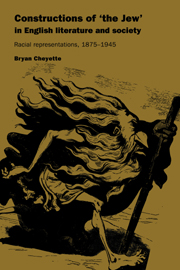Book contents
- Frontmatter
- Contents
- Preface
- Acknowledgements
- 1 Introduction: semitism and the cultural realm
- 2 The promised land of liberalism: Matthew Arnold, Anthony Trollope and George Eliot
- 3 Empire and anarchy: John Buchan and Rudyard Kipling
- 4 The ‘socialism of fools’: George Bernard Shaw and H. G. Wells
- 5 The limits of liberalism: Hilaire Belloc and G. K. Chesterton
- 6 Modernism and ambivalence: James Joyce and T. S. Eliot
- 7 Conclusion: semitism and the crisis of representation
- Bibliography
- Index
3 - Empire and anarchy: John Buchan and Rudyard Kipling
Published online by Cambridge University Press: 19 October 2009
- Frontmatter
- Contents
- Preface
- Acknowledgements
- 1 Introduction: semitism and the cultural realm
- 2 The promised land of liberalism: Matthew Arnold, Anthony Trollope and George Eliot
- 3 Empire and anarchy: John Buchan and Rudyard Kipling
- 4 The ‘socialism of fools’: George Bernard Shaw and H. G. Wells
- 5 The limits of liberalism: Hilaire Belloc and G. K. Chesterton
- 6 Modernism and ambivalence: James Joyce and T. S. Eliot
- 7 Conclusion: semitism and the crisis of representation
- Bibliography
- Index
Summary
‘… God works by races, and one was appointed in due season and after many developments to reveal and expound in this land the spiritual nature of man. The Aryan and the Semite are of the same blood and origin, but when they quitted their central land they were ordained to follow opposite courses. Each division of the great race has developed one portion of the double nature of humanity, till after all their wanderings they met again, and, represented by their two choicest families, the Hellenes and the Hebrews, brought together the treasures of their accumulated wisdom and secured the civilisation of man.’
Benjamin Disraeli, Lothair (London, 1870) volume XI of the 1927 Bradenham edition, p. 397INTRODUCTION
In contrast to those writers who attempted uneasily to contain a racialized ‘Jew’ within Arnoldian liberal notions of ‘culture’, the Imperialist writers in this chapter are quite explicit about privileging ‘race’ over ‘culture’ in their constructions of ‘the Jew’. Benjamin Disraeli, in particular, rewrote in Imperial terms the binary oppositions utilized by Matthew Arnold in Culture and Anarchy. According to Disraeli, ‘the Jew’ represented ‘religion, property and natural aristocracy’, the very foundations of Empire. This influential reworking of Arnold was taken up by the later writer-colonialists, John Buchan and Rudyard Kipling. These authors adopted Disraelian racialized notions of ‘the Jew’ to counter socialist and radical liberal constructions of degenerate ‘Jewish financiers’ who were said to have caused the Boer War (1899–1902) for their own ‘alien’ capitalist interests.
- Type
- Chapter
- Information
- Constructions of 'the Jew' in English Literature and SocietyRacial Representations, 1875–1945, pp. 55 - 93Publisher: Cambridge University PressPrint publication year: 1993



